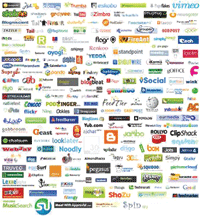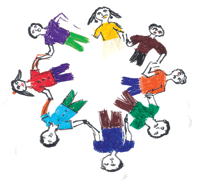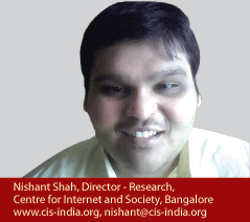|
In this issue of netgov Speak, in the lead up to Third Internet Governance Forum, to be held in Hyderbad, India, we bring you a hot topic for debate on governing Social Networking sites. With the proposal of EU to bring forth a new legislation to regular these sites, it opens up the issues that confront lawmakers and law enforcement agencies on one hand to those who campaign for the value of digital freedom on the other. |
Is there a need to monitor the content on social networking
sites?
On 27 May 2008, the European Network and Information Security Agency (ENISA) issued a position paper for drawing up a new legislation that would regulate social networking sites. ENISA, which was created in 2004 to oversee online security measures in the 27 EU countries, in which it pointed out that social networking sites such as Facebook and MySpace need more regulation to protect their users against security risks. “Social networking sites are very useful social tools but we must make recommendations for how to better protect people from the risks these sites create,” said Andreas Pirotti, executive director of ENISA and author of the report. In Pirotti’s opinion, network security is under a permanent threat from spammers or criminals. “Internet security is extremely important, considering how much business takes place online now.” Some of the threats related to social networking identified by ENISA are related to face recognition, digital dossiers, reputation damage, social engineering attacks on enterprises, phishing attacks, ID theft and others. The report of the organisation includes 19 recommendations to social networks on ways to improve security practices. Among other things, ENISA calls for a regulatory review of social networking frameworks, an increased transparency of data handling practices, more education for users on security, and the discouragement or even banning of social networking in schools.
A study conducted by enterprise IT management company CA and the National Cyber Security Alliance in 2006 found out that the majority of users of social networking sites were not very aware of the security issues involved. 83 percent of them admitted having downloaded unknown files from unknown users and 74 percent said that they were easily providing the personal data online. Also, a Symantec report issued in 2007 showed that social networking sites offer easy pickings for phishers. The security practices of the respective sites make it easier to invade and to spread attacks to more people.

The booming social networking space and web 2.0
technologies
 With more than 130 hugely popular community networking sites, and booming rapidly, social networking on the Internet has taken a new dimension in defining the ethos and culture of the use of Internet. The social networking spaces have evolved in an organic way and have used several interactive tools including feeds, polls, commenting, sharing, and modular tracking services like birthday tracker, rss feeds, digg it, etc, which allows knowledge to flow freely. This evolution has created a new ethos of knowledge sharing and digital rights for the masses. People no more need to be technically savvy to publish, code or upload content on the Internet. Such a free flow of information from various quarters is not without its set of problems, and potential challenges that face regulators, lawmakers and enforcement agencies, who worry about its potential for misuse.
With more than 130 hugely popular community networking sites, and booming rapidly, social networking on the Internet has taken a new dimension in defining the ethos and culture of the use of Internet. The social networking spaces have evolved in an organic way and have used several interactive tools including feeds, polls, commenting, sharing, and modular tracking services like birthday tracker, rss feeds, digg it, etc, which allows knowledge to flow freely. This evolution has created a new ethos of knowledge sharing and digital rights for the masses. People no more need to be technically savvy to publish, code or upload content on the Internet. Such a free flow of information from various quarters is not without its set of problems, and potential challenges that face regulators, lawmakers and enforcement agencies, who worry about its potential for misuse.

According to Venkatesh Hariharan, Co-founder of Open Source Foundation of India, “Social Networking Sites are very useful to form communities with like-minded people. For example we have been actively engaged in a community which is against software patents, and a candlelight vigil, using Facebook, and other networking media. This is especially valuable when people are distributed across the country, and globally, online communities makes it possible to mobilise the support at very short notice, which otherwise is not possible! Even though these communities are asynchronous, they are faster, and more responsive that email discussion lists.”
Social networking sites have a huge youth following!
In a survey conducted among the youth in India on the value of social networking sites and their value to the users, the respondents strongly felt that the social networking sites like Orkut, Facebook, Myspace and LinkedIn must not be regulated and it should permit free flow of information. The respondents, however, felt that they should have more control and checks of who could and could not view their profiles and to have a system by which they could regulate who coud access their information.
Kriti Madhukar, a first year college student of Delhi University, is an “Orkutter” who is adept at multi-panel chatting, sharing photos, planning events, sharing music, and discussions, and having fun catching up! She has also experimented with Facebook, Hi5, and says, “social networking space is an important aspect of today’s urban youth. We cannot imagine that only less than a decade ago, the Internet was not so robust or even accessible in many parts of the world. It is very important to create more such opportunities for also the rural folks in India, who speak innumerable languages, and once they have access to public Internet, they should immediately be able to join the social networking space.”
Social networking sites have also created an empowering avenue for early learners, people who are otherwise not social to explore the world for friendship, learning, sharing, peer support, etc. These social networks have evolved as a result of more open-ness in accessing and publishing on the net. It has also led to a world of challenges while experiencing the power of freedom of expression. The current debate to examine the privacy and security issues and whether they must be regulated faces many contrasting perspectives. The European Union, as cited above, would like to address several issues and has provided a concrete picture of how to handle the concerns, in the rapidly expanding universe of social networking space.
Sociology of online social networks
 Some of the social impacts of networking sites are worth reflecting on. LinkedIn, for example, is a professional, business network, which is used extensively across the world, and in India too, for job scoping and senior executive searches. It is also used to create a network of professional interest and to build alliances. The kind of services that the network provides makes it of different value than that of generic social networking sites that allow gathering in cyberspace based on social aspects, like friendship, interactions, informal dialogues, and peer-to-peer sharing of data, images, audio and video footages, that are now getting more and more prevalent.
Some of the social impacts of networking sites are worth reflecting on. LinkedIn, for example, is a professional, business network, which is used extensively across the world, and in India too, for job scoping and senior executive searches. It is also used to create a network of professional interest and to build alliances. The kind of services that the network provides makes it of different value than that of generic social networking sites that allow gathering in cyberspace based on social aspects, like friendship, interactions, informal dialogues, and peer-to-peer sharing of data, images, audio and video footages, that are now getting more and more prevalent.
One of the key issues that worries parents, teachers and policy makers is whether these online social networking sites are “child safe”. The responsibility lies at all levels. Parents have to play a direct role in keeping a watch on their children’s behaviour online, the networking sites should have their norms and standards of what content can be shared, and governments have to be more rigourous in the laws on admissible content, though it is one of the most chalenging assignments. Owners/promoters of the online social networking sites have the responsibility to create mechanisms to vote out unfavourable site, and to block users who post irresponsible materials.
Yet, there remains some key concerns relating to privacy, quality of content, IPR issues, both from the point of view of security and ownership of content. There could be two opposing schools of thought: one, which advocates for no-holds-barred and open sharing, and another that ensures that the community space is “safe, secure, and condusive”. The debate thus is very interesting.
Identity issues in social networking sites
Identity thefts is a major issue that worries most users, even in countries where privacy issues are not that seriously taken. There have been instances when intruders have stolen identities and personal information, impersonated and sent out posts that cause serious concerns. The recent Mumbai wifi hacking case, which misused the identity and IP of the person to send out terror mails, is an example of the risks that we are subjected to when nefarious persons steal identities and further their vicious and malafide intents.
The issue is more serious with bankers getting interested to address the privacy issues as well as ecommerce applications wherein the identity thefts are happening in greater numbers. Cybersecurity is still a nascent area of law and administration, and the police departments across the world are gearing up to be responsive and be aware of the nuances of laws of the land, and how they are applicable. A lot of work on awareness creation among the police officers is also essential, as per the views of a Human Rights and Freedom of Expression Activist, who has been associated with advocacy work around the rights of expression.
The debate continues… with more questions than answers!
Readers are invited to share their views/experiences/ new issues to
raise, to be part of the debate, on the social and security impacts of
online social networking sites. Have your say! Please write to:
response@i4donline.net
info@i4donline.net
Interview
“A mechanism of self-governance
is needed for social networks”

Should social networking sites be governed, and if yes, in
what way?
A call for either monitoring or censoring Social Networking Sites has long been proved ineffectual, with the users always finding new ways of circumventing the bans or the blocks that are put into place. However, given the ubiquitous nature of SNS and the varied age-groups and interests that are represented there, governance, which is non-intrusive and actually enables the users towards a better and more effective experience of the site, is always welcome. The presumed notion of governance is that it will set processes and procedures in place which will eventually crystallise into laws or regulations. However, there is also another form of governance – governance as provided by a safe-keeper or a guardian, somebody who creates symbols of caution and warns us about being cautious in certain areas. In the physical world, we constantly face these symbols and signs which remind us of the need to be aware and safe. Creation of a vocabulary of warnings, signs and symbols that remind us of the dangers within SNS is a form of governance that needs to be worked out. This can be a participatory governance where each community develops its own concerns and addresses them. What is needed is a way of making sure that these signs are present and garner the attention of the user.
How do we address the concerns that some of the social
networking spaces are not “child safe”?
The question of child-safety online has been one of the most raging debates ever. Several models like the cybernanny to monitoring the child’s activities online have all been suggested at different times and have more or less failed. The concerns of what happens to a child online are the same concerns as what happens to a child in the physical world. When the child goes off to school, or to the park to play, we train and educate them about things that they should not be doing – do not talk to strangers, do not take sweets from strangers, do not tell people where they leave, don’t wander off alone – and hope that these will be sufficient safeguards to their well being. As an added precaution, we also sometimes supervise their activities and the things they are consuming on other media. More than finding technical solutions to safety in being online, it is a question of education and training and some amount of supervision to ensure that the child is complying to your idea of what is good for it. A call for sanitising the internet or for insisting on child safety is more or less redundant, only, in fact, adding to the dark glamour of the web and inciting younger users to go and search for material which they would otherwise have ignored.
What are the issues, especially around identities and profile
information privacy rights of users of social networking sites?
The main set of issues, as I see it, around the question of identities, is the mapping of the digital identities to the physical selves. The questions would be : what constitutes the authentic self? what is the responsibility of the digital persona? Are we looking at a post-human world where the online identities are equally a part of who we are and some times even more than that? Does the older argument of the Original and the Primary (characteristics of Representation aesthetics) still work when we are talking about a world of ‘Perfect Copies’ and ‘Interminable networks of selves’ (characteristics of Simulation)? How do we create new models of verification, trust and networking within a SNS. Sites like facebook and Orkut, with their ability to establish looped relationships between the users and the notion of inheritance – friend of a friend of a friend of a friend, or even testimonials and open ‘walls’ and ‘scraps’ for messaging are already approaching these new models of trust and friendship.
How do we strike a balance between the freedom of speech
and need to maintain law and order – when it comes to
monitoring social networking sites?
I am not sure if the ‘freedom of speech and expression’ and the ‘maintaining of law and order’ need to be posed as antithetical to each other. Surely, the whole idea of ‘maintaining law and order’ already includes maintaining conditions within which freedom of speech and expression can be practiced. Instead of monitoring social networking sites to censor and chastise (as has happened in some of the recent debates around Orkut, for example), it is a more fruitful exercise to ensure that speech, as long as it is not directed at direct offense towards an individual or a community, needs to be registered and heard. Hate speech of any sort should not be tolerated – but that is a fact that is already covered by the judicial systems around the world.
What perhaps, is needed online, is a mechanism of self-governance where the community should be able to decide the kinds of actions and speech which are valid and acceptable to them. People who enter into trollish behaviour or hate speak, automatically get chastised and punished in different ways by the community itself. To look at models of better self-governance and community mobilisation might be more productive than producing this schism between freedom of speech on the one hand and the maintenance of law and order on the other.
Be a part of Elets Collaborative Initiatives. Join Us for Upcoming Events and explore business opportunities. Like us on Facebook , connect with us on LinkedIn and follow us on Twitter, Instagram.











